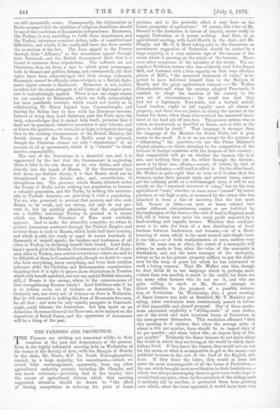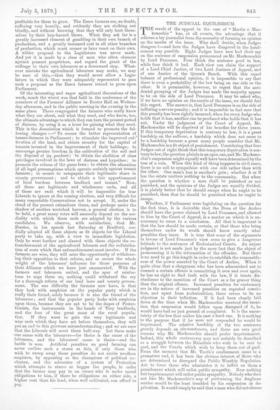THE FARMERS AND PROTECTION. T HE Farmers are striking out somewhat
wildly, in their vexation at the past and despondency at the present. Even in the highly influential meeting held on Wednesday at the rooms of the Society of Arts, with the Marquis of Huntly in the chair, Mr. Storer, M.P. for South Nottinghamshire, carried, by a large majority, his amendment,—which re- ceived little encouragement, apparently, from any other agricultural authority present, including Mr. Chaplin, and was much criticised,—providing that in the inquiry into the causes of agricultural distress which that meeting supported, attention should be drawn to " the effect of forcing competition in reducing the price of home produce, and to the probable effect it may have on the future prosperity of agriculture." Of course, this rider of Mr. Storer's to the resolution in favour of inquiry, means really to suggest Protection, or it means nothing. And that, at an agricultural meeting, with Lord Huntly in the chair, and Mr. Chaplin and Mr. C. S. Read taking part in the discussion, an amendment suggestive of Protection should be carried by a large majority, is a very ominous sign of the amount of the strain which is pressing on the minds of the farmers. There were other symptoms of the intensity of the strain. For ex- ample, a Northern farmer who has evidently read John Stuart Mill, and fastened with a true sagacity on that very effective phrase of Mill's, " the unearned increment of value," is re- ported to have delivered himself thus to the Marquis of Huntly and the great agricultural interest :—" Mr. Walker (Lincolnshire) said when the country adopted Free-trade, it omitted to adapt the taxation of the country to the new set of circumstances ; the result was that they had not a legitimate Free-trade, but a bastard article. Local burdens ought to fall equally upon all classes of property, and there was no justice in taxing the income of the farmer for these, when those who received the unearned incre- ment of the land got off scot-free. The present system was as rotten as toucliwood, as deceitful as Satan, and as false as the place in which he dwelt." That language is stronger than the language of the Member for South Notts, but it goes nearer to the mark. It is of no use except for the purpose of " obfuscating " the question,—to use the Prime Minister's elegant phrase,-.-to direct attention to the competition of the farmers of foreign countries with the farmers of this country ; that competition will go on whether the farmers like it or not, and nothing they can do, either through the Govern- ment or by their own efforts,—except, of course, by dint of successful industry,—will avail to affect it. On the other hand, Mr. Walker is quite right that so soon as it is clear that the farmers, under their present rents and present taxes, cannot get the ordinary profit on a well-managed farm, it will be not merely on the " unearned increment of value," but on the true agricultural "rent," whether in some sense "earned" by recent purchase at too high a rate, or unearned by the owner who has inherited it from a line of ancestry, that the lose must fall. Sooner or later,—so soon as leases entered into under different circumstances expire, or are forfeited by the bankruptcy of the lessee,—the rent of land in England must fall, till it leaves once more the usual profit expected by a hard-working and capable farmer. Whether that readjust- ment is to take the' form of a new distribution of local burdens between landowners and tenants,—or of a direct lowering of rents, which is the most natural and simple form it can take,—or of both readjustments at once, matters very little. In some way or other, the owner of a monopoly will always be made to lose, when the value of the monopoly is diminished, and not the mere manager of the monopoly, except as far as his private property suffices to pay the defici- ency for the term of years for which he has contracted to work a losing concern, That Mr. Walker sees this, though he does think fit to use language which is, perhaps, more violent than was needful, is much to his credit, for there are too many other farmers who do not see it, and who are quite willing to catch at Mr. Storer's attempt to divert attention to the prospect of a possible restora- tion of Protection. On Wednesday, also, a groat meeting of Essex farmers was held at Romford, Mr. T. Mashiter pre- siding, when resolutions were unanimously passed in favour of that impossible and absurd proposal. One of these resolu- tions advocated explicitly a " sliding-scale " of corn duties, one of the worst and most injurious forma of Protection to the corn-growers themselves. This resolution affirmed " that this meeting is of opinion that when the average price of wheat is 50s. per quarter, there should be an import duty of 5s. per quarter ; and when below 40s., an import duty of 10s. per quarter." Evidently the Essex farmers do not know either the world in which they are living, or the world in which their fathers lived. If they knew the former, they would not cry out for the moon, or what is as impossible to get as the moon,—an artificial increase in the cost of the food of the English mil- lions. If they knew the latter, they would at least not covet the most unmanageable of all the forms of Protection,— the one which brought most mortification to their forefathers,— which was always encouraging them to grow corn in the hope it would fetch one price, when by the operation of the sliding-scale it suddenly fell to another, or prevented them from growing corn which, when the issue appeared, it would have been very profitable for them to grow. The Essex farmers are, no doubt, suffering very heavily, and evidently they are striking out blindly, and without knowing that they will only hurt them- selves by their hap-hazard blows. What they ask for is a greatly increased element of gambling in their own branch of production, and a greatly increased cost in all other branches of production, which must sooner or later react on their own. A wilder proposal to the Legislature was never made. And yet it is made by a class of men who often clamour against peasant proprietors, and regard the grant of the suffrage to their own labourers as a downward step. What- ever mistake the agricultural labourers may make, we may be sure of this,—that they would never allow a Legis- lature in which they were adequately represented to pass such a proposal as the Essex farmers intend to press upon Parliament.
Of the interesting and eager agricultural discussions of the week, much the wisest was that held in the conference of the members of the Farmers' Alliance in Exeter Hall on Wednes- day afternoon, and in the public meeting in the evening in the same place. There congregated the farmers who really know what they are about, and what they need, and who know, too, the ultimate advantage to which they can turn the present period of distress, by using it as a lover for gaining what they need. This is the Association which is formed to promote the fol- lowing changes :—" To secure the better representation of tenant-farmers in Parliament ; to stimulate the improved tivation of the land, and obtain security for the capital of tenants invested in the improvement of their holdings; to encourage greater freedom in the cultivation of the soil and the disposal of its produce ; to obtain the abolition of class privileges involved in the laws of distress and hypothec; to promote the reform of the game laws ; to obtain the alteration of all legal presumptions which operate unfairly against tenant farmers ; to secure to ratepayers their legitimate share in county government ; and to obtain a fair apportionment of local burdens between landlord and tenant." Now, all these are legitimate and wholesome ends, and all of these are ends which it will be impossible for true Liberals to ignore at the coming election, and very difficult for many respectable Conservatives not to accept. If, under the cloud of the present calamitous times, and perhaps under the shadow of another wretched harvest, a general election is to be held, a great many votes will assuredly depend on the cor- diality with which these ends are adopted by the various candidates. We observe, with satisfaction, that Mr. Forster, in his speech last Saturday at Bradford, cor- dially adopted all these objects as fit objects for the Liberal party to take up, with a view to immediate legislation. Only he went further and classed with those objects the en- franchisement of the agricultural labourer and the redistribu- tion of seats which that enfranchisement must involve. If the farmers are wise, they will seize the opportunity of withdraw- ing their opposition to that reform, and so secure the whole weight of the labourers' influence for those purposes of their Alliance which we have just enumerated. With the farmers and labourers united, and the spur of misfor- tune to urge them on, nothing could withstand the cry for a thorough reform of our land laws and county govern- ment. The one difficulty the farmers now have, is that they look with suspicion on the popular party which is really their friend, solely because it is also the friend of the labourers ; and that the popular party looks with suspicion upon them, because they are apt to be the dupes of Protec- tionists, the instruments in the hands of Tory landlords, and the foes of the great mass of the rural popula- tion. If they want to gain the very legitimate and wise ends which they have set before themselves, they will put an end to this grievous misunderstanding ; and we are sure that the Liberals will meet them half-way, Let them make one cause with the labourers—for theirs is the cause of the labourers, and the labourers' cause is theirs—and the battle is won. Artificial penalties on good farming can never outlive such a storm as this, if only those who wish to sweep away these penalties do not excite needless suspicion, by appearing as the champions of political ex- clusion, and the advocates of a system of Protection which attempts to starve or beggar the people, in order that the farmer may pay to an owner who is under moral obligations to him, if there be obligations on either side, a higher rent than his land, when well cultivated, can afford to pay.



































 Previous page
Previous page